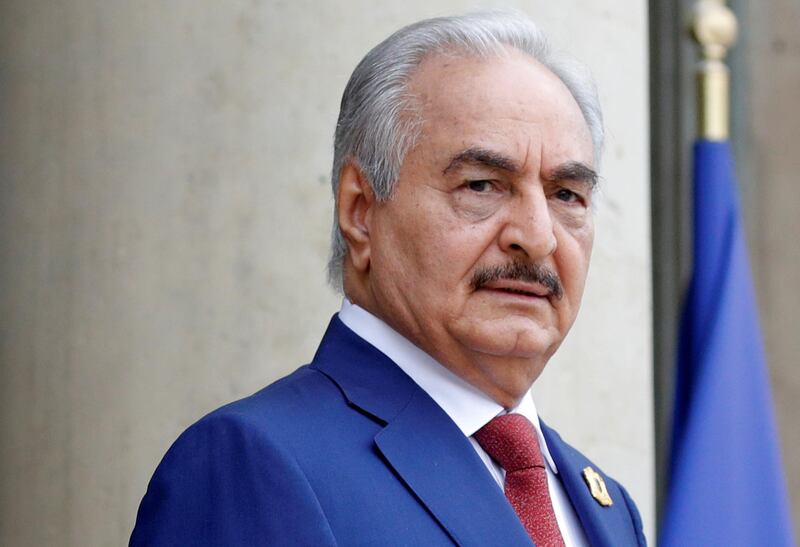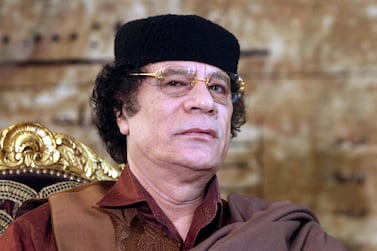Fighting around the Libyan capital of Tripoli will halted on Sunday after the Libyan Government of National Accord agreed to follow suit as the rival Libyan National Army announced a cessation of hostilities.
The move comes after days of efforts by Moscow and Ankara to pause the battle for the Libyan capital, launched in April by Field Marshal Khalifa Haftar in a bid to end the rule of rag-tag militias that back the administration in the west.
On January 8, following a meeting between President Vladimir Putin and President Recep Tayyip Erdogan, Turkey and Russia urged Libya’s warring factions to declare a ceasefire amid clashes and air strikes in a conflict drawing increasing foreign involvement.
LNA spokesman Ahmed Mismari confirmed the ceasefire but an LNA official told The National that "we will reply if they shoot".
In a statement posted online early on Sunday, the GNA said: “In response to the Turkish president and the Russian president’s call for a ceasefire, the head of the Presidency Council of the Government of National Accord announces a ceasefire starting 00:00 on January 12.”
The GNA said it had recorded “violations” of the ceasefire minutes after it was supposed to take effect in the early hours of Sunday. The government did not specify what kind of violations in its written statement.
Meanwhile, a general for the opposing east-based forces said that his lines had also been targeted by several missiles. Brigadier General Khaled Al Mahjoub, who is in charge of mobilising the east-based forces, said that some battalions had been the subject of “random” incoming shells. He said that the attacks were not large enough to warrant a response.
The Associated Press could not verify either of the sides’ claims, and as of midday Sunday that ceasefire appeared to be holding, if uneasily.
Russia is a backer of the LNA while Turkey backs the GNA. Russia and Turkey have co-operated closely on Syria where both countries have boots on the ground backing opposing forces.
Earlier on Saturday, before the announcement, Mr Putin and German Chancellor Angela Merkel met in Moscow and called for international efforts to address the crisis in Libya.
“I am really counting on the opposing sides in Libya ceasing fire, ceasing armed combat ... within a few hours,” Mr Putin said. “It’s important to bring an end to the armed confrontation.”
Mrs Merkel, making her first visit to Russia since 2018, said she hoped “the Turkish-Russian efforts will be successful”, calling a ceasefire a first step in a peace process.
Mr Putin and Ms Merkel both backed a Libya peace conference in Berlin being organised by the UN special envoy to Libya, Ghassan Salame, which could be held within weeks.
Mr Putin called the initiative “timely” and a “very good step in the right direction”.
He said the conference must include “countries that have a real interest in promoting a peace settlement” and decisions must be agreed in the first instance with the Libyan sides, and with the involvement of Mr Salame.
Field Marshal Haftar’s forces, which began their offensive on Tripoli in April, did not specify how the ceasefire would come into effect.
Speaking in Rome after meetings with Italy’s prime minister, GNA Prime Minister Fayez Al Sarraj earlier welcomed the Turkish-Russian initiative, but said any ceasefire would be conditional on a withdrawal of Field Marshal Haftar’s forces.
In Cairo, the speaker of Libya’s eastern-based parliament, Aquila Saleh, appeared to ask Egypt to send troops to Libya to counter any “foreign intervention”, a reference to Turkey’s stationing of troops and Syrian militants in support of the Tripoli-based government.
Mr Saleh made the remarks when he addressed Egyptian members of parliament on Sunday.
Egypt’s parliament, which is overwhelmingly pro-government, must approve any plans to send troops to a foreign country.
Egypt supports the LNA, but President Abdel Fatah El Sisi has said Cairo has no intention to directly intervene militarily in Libya, with which Egypt shares a long desert border.
Libya is divided between the GNA in Tripoli and Field Marshal Haftar’s forces in the east and the south, and European governments are concerned about Islamist militants and migrant smugglers taking advantage of the chaos.







